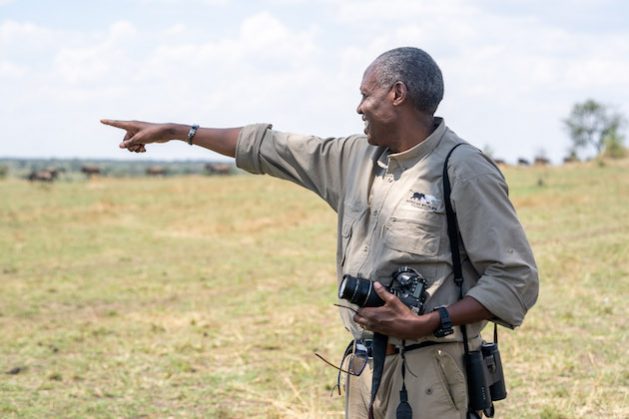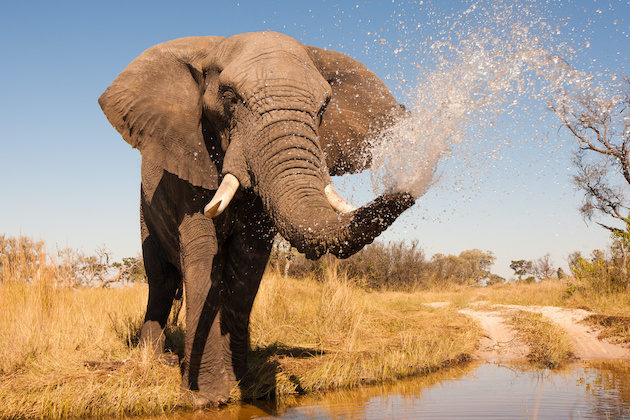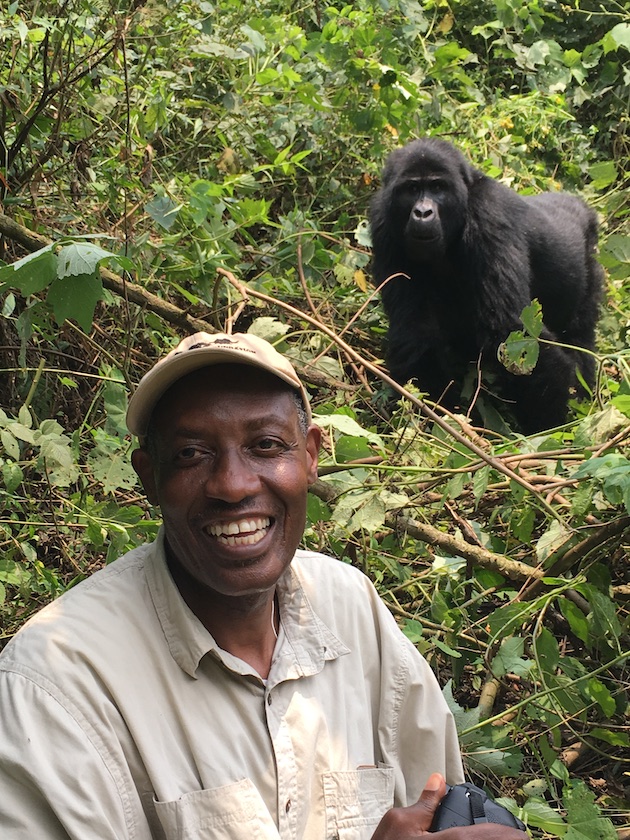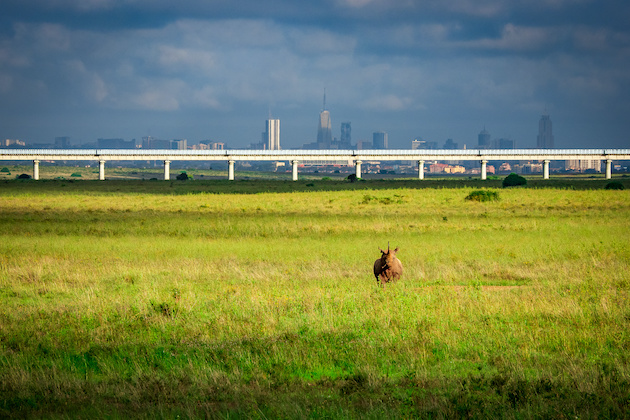A Voice for African Wildlife: A Conversation with Kaddu Sebunya

St Davids, Wales, Jun 30 (IPS) - The CEO of the Nairobi-based African Wildlife Foundation, Kaddu Sebunya – in London to mark AWF’s 60th anniversary while fundraising and lobbying – shares his thoughts with IPS on the climate and food crises, how Africans have their voice, why western countries need a ‘reset’ with Africa, what Prince Charles should say to the Commonwealth, how China is eating western ‘cake’, and what worries him more than anything else.
(IPS) How are the crises of climate and food security impacting AWF across Africa?
“It has a huge impact because everything is interconnected. In Kenya, we lost about 78 elephants to drought in Tsavo National Park . That’s more than any poaching, higher than any cause of death of elephants in the last 15 years. Elephants are a key species – when they suffer, we know what’s going to happen to the plants, the frogs, the butterflies, the trees. They are a key we use to measure the health of the ecosystem. The elephant can tell you a lot about what is going to happen to all other species, including humans.

Drought and food shortages: people are going to make different choices. They are going to change the way they live. In many cases, the resources suffer. Smaller choices mean a different diet, so they use more firewood, they are going to cut more trees. When there is food scarcity and drought they are going to rely on hunting for protein… For many Africans, 70 per cent plus are in agriculture – that’s their livelihood. If there is drought they are going to pick other options. If the Maasai have lost 40 percent of their livestock in northern Kenya they are going to look for alternatives… The nearest resource is going to be wildlife.
Governments are sourcing from the same budgets. If there is drought they will change priorities. Always environment and conservation are going to be the last choice. Education is going to suffer. All these other sectors suffer because the budgets are being reprioritised to drought and health.
And at the global level, you see in central and west Africa the impact on migration. We see rural areas emptying and young people moving to urban areas with no skills. Especially women and young girls suffer more. The young boys are recruited into terrorist groups or trafficked to Europe. So the repercussions of this are not just natural resources… it distorts the whole set-up, entire cultural systems, the entire social network and safety nets, and breaks down government systems… It’s larger than just food… Societies are broken down. Bringing food in risks destroying local agriculture. This is why Ukraine is so important, raising the question of dependency on imported food.”
What is AWF’s response?
“Our work is to represent the voice of wildlife. Animals don’t speak. Someone has to do that for them. We take that responsibility very seriously, in all these changes for us to be at the table, whether a board room, in corridors of parliament or community meetings, to be that voice for wildlife… The only long-term solution for drought is how we can manage nature better.
But in most cases that is not factored in when we are talking about addressing the symptoms, when addressing famine so bring in biscuits from Europe and elsewhere, high energy food… That’s not a solution, that’s a band-aid … I was talking to someone from Ethiopia, he said the problem we have is all these NGOs and INGOs are bringing plastic into villages in Ethiopia and it doesn’t come with the education of how you are going to dispose of all this plastic.
Historically it has been easier for international communities to talk to international NGOs who have been working on the continent or to talk government to government. It hasn’t given us good solutions to our problems historically. And that’s what we are asking that needs to be changed. It’s going to take Africans to take ownership and responsibility and leadership, to permanently solve the problems Africa has. We don’t have very good results where things have happened without African leadership.
There are very few cases. Where that has been successful it has been very expensive, especially in our sector… They are either training thousands of rangers, they are bringing guns, they are buying and fuelling vehicles, and carrying on training to protect 1500 elephants. What we are doing, it is actually cheaper if you are supporting Africans who don’t need guns to protect wildlife, they use a relationship with wildlife, who can be supported in developing their wildlife economies…
Sometimes we think our work is to make it cheaper and sustainable. Models that have been used are not sustainable. Governments cannot sustain areas that require thousands of rangers and vehicles, I mean Serengeti is the size of a country in Europe… Everything I am telling you is coming from our experiences, what works and doesn’t work. The challenge we have now over the next 10 years is how do we scale it up.
A project we have been running in northern Rwanda for 30 years, the conservation of mountain gorillas, and how we have mobilised communities for them to have a stake in the tourism. Thirty years ago eco-tourism was an investor coming to the area, gets a concession, builds a wonderful lodge and he just had to hire local Africans and get a group of local women to dance for tourists, get a few households to sell crafts at the lodge and that model still exists… We said it’s not enough. We raised the bar. Now we are talking about equity – communities must have equity in the tourism business and so in the lodges we build, like in Rwanda, Kenya, Namibia, Botswana, the communities own the lodge. The private investor is a management firm.

The hard work in that formula is how to mobilise communities in that business unit. What works for that is our relationships with government. You can’t do that in isolation to policies and laws… the conservation approach is political, economic and social. It’s not about the science of conservation. It’s not about the behaviour of elephants and rhinos. You have to get involved in the political discussion, the social discussion, the economic discussion and that’s how you start moving… We flipped the investment model. It takes a lot of time but it’s extremely successful.
How is China’s growing role in Africa affecting conservation work?
We work in China. Pre-COVID I was spending a lot of time in Beijing talking to policy and Communist Party officials. It’s good. We have seen results. We are part of the groups that helped China ban the ivory trade about six years ago… I was in Beijing. The day that China announced it, the price of ivory fell by 70 percent. Demand fell 65 percent for our African ivory… it was huge. We are working with China on mainly three fronts: it’s the Chinese footprint on our continent: the infrastructure they are building, farming, the industries they are setting up in Africa. We are asking them to be responsible in doing that.
We are not stopping it… Initially, they were telling us it was not their responsibility, that’s African governments’ responsibility, it’s the contracts they signed with the African governments and African governments need to tell them what they want and African governments are not telling us we care about the environment so we are not going to care about it. We talked to them, we called them out.
It was so important, they told me after huge arguments that went on for a year, to hear from an African NGO directly. So we are succeeding in that. The other approach we used is that making sure that African governments are making these conditions so we spend a lot of time with African ambassadors in Beijing… The last thing that China wants to hear is Europe asking them to do better in Africa or US asking them to do better in Africa… Right now we have a technical advisory role to the African delegation on the Convention on Bio-diversity .
Our third thing is people to people, especially the youth. If anything good comes out of this COVID it is Zoom, so we have created platforms where African youth interact with Chinese youth and they are having very very interesting conversations about Africa, about wildlife, educating each other. That’s where the future is... Culturally we are very connected, family and extended families, cousins and aunts and uncles, it’s so common between Chinese and Africans. The connection culturally is just so real. To the young people this is a globalised world… Culturally it is changing, we have seen that with consumption of African wildlife. We talk to older Chinese and they still think that owning ivory is a big deal, an investment. The young people want a Polo shirt and an Apple watch for their status, and so do the young Africans. They want to drive a Porsche, not have tonnes of ivory in their homes like their grandparents.
We have a very good relationship with Beijing zoo and Shanghai zoo where every year we have an exhibit for three months. One in Beijing, before COVID, 300,000 people were going in a day. The numbers in China are mind-blowing. They go with their families, they learn about the species and the habitat, they watch the videos. These are young middle-class families, they start questioning things. We have seen change in China.
How can the UK/EU change Africa policies and deal with China’s growing presence?
example is the Commonwealth. I think the UK has the opportunity to reset… I think the UK has an opportunity to change their role from big brother to maybe an uncle who sometimes is invited to a dinner and is sometimes left out of a wedding. But it’s a huge opportunity for UK, and I don’t see that happening as quickly as it should.
I told the European Union parliament and some folks here in the UK in the discussion about China that it’s tiring when you hear UK officials or EU officials complaining about China.
For an African it’s really tiring. And I have been telling them: look China is not eating Africa’s cake, China is eating UK, French and German and Italian cake in Africa… because for the UK to whine about China in Africa when half of Africa speaks your language, half of Africa believes in you and have common values.
Seventy percent of African leaderships attended Oxford, Yale, Harvard, London University and you sit in London and complain about China? A huge population of Africans are British. I’m yet to find a Chinese African or a community of Africans who speak Chinese.
The western world has to think deeper to understand the options China has given Africans. And look in the mirror and ask why, and counter offer and have a serious conversation. The Germans are doing that by the way – they are rethinking their engagement and I hope that actually with the war in Ukraine is going to change the relationship between Africa and Europe.
You have a continent that has the richest minerals and richest industrial resources on the planet and you rely on Russia and for food?
It’s mind boggling.
You rely on a country you define as enemy. It’s total neglect of a continent that is so rich, because it’s easier for Africa just to be exploited and do it that way and do the trade with Russia who is the enemy. But ‘we’ don’t want to trade with Africa, we just want to continue exploiting.
And see what’s happening now. It’s that reset. It can be led by the UK, especially now as it has exited the EU. But I don’t see that thinking here.
If I was to address the Commons that is what I would tell them. I don’t see them taking on that opportunity the UK has through the Commonwealth which is coming up. I don’t know what Prince Charles’ address is going to be but that’s what it should be.
‘Africa’s resources are above, not below, the ground’

Our work is to tell Africans that our wealth is above the ground. It’s not underground as UK, France and others have told Africans. It’s only when I come to Europe and North America where I hear Americans and Europeans say Africa is mineral-rich. Out of 54 countries, there are less than 10 countries that are mineral-rich, so where is this idea that Africa is mineral-rich? And somehow Africans bought into that because Europe and North America only want the minerals in Africa.
But the wealth of the continent is above the ground.
We can feed Europe with organic food… you can achieve two objectives with one approach: you can get organic food out of Africa, stop the famine going on, but also you can offer Africa a better model of development, because if you don’t, what happens in Africa won’t stop in Africa, it will reach London and then the streets, whether in terms of refugees or in terms of flooding because of climate change, or just loss of biodiversity...
It is so important that we start treating Africa as the last frontier for global solutions, whether it’s health – the next virus is going to come out of Africa, no doubt.
Africa is the last frontier of animals. It is in all our interests that the virus stays in the wild lands and the wildlife and that‘s the work of conservationists…
You want to solve climate change, you need to do something in a country that absorbs carbon… The source of energy for Congolese should be the most important solution for UK climate change policy. Because the Congolese population is growing – you know the largest French-speaking city is Kinshasa, it’s not Paris. If those folks continue to rely on firewood as their energy source, you will have more carbon in the air and temperatures rising.
I sound cynical but you don’t have to change your way of life drastically, but if you help Africa to leapfrog that change shouldn’t be so drastic but the more you don’t help Africa leapfrog, the harder it will be for everyone... So the choices Africans are making to their prosperity is so crucial to the rest of the world… guess what, Africa is chasing the western world… they want London in Kenya just as it is. They want to drive big cars, they want to own a village house and a summer house, planes.
‘What worries me more than anything else…’
People need to know what Africans think. We don’t have to be right but what is our opinion… More importantly, Africans need to hear from Africans. There is a growing movement in Africa that actually worries me now more than anything else among the young people who think that it’s just ‘the western world doesn’t like us, that we just have to forget the rest of the world, that conservation is a lie, it is really about westerners wanting to grab our land, it’s a quirky way of taking land out of production so Africa’s doesn’t develop.’ That movement has been within my generation but a little bit silent.
The young people are picking that up and they are saying you know these are our resources, we can do whatever we want… I can’t see my children or their children coming to Brussels to negotiate with Europe, going to the US and saying how can you help me to deal with the trees or listening to you… Our grandchildren they will cut down those forests, they will drain all the water, they will do whatever they want because already they are not listening to us… they are so independent they do what they want. Now when they get in power – in 20 years the 14-year-olds will be the ministers – they are not going to come and attend the Commonwealth, no! Not unless the Commonwealth changes. They are stubborn and angry with the rest of the world. They want to figure out their own ways, they are independent.
They are like any teenager in London, so the rest of the world has 10 years to figure this out before that generation takes over.
My generation we are more diplomatic, we are more forgiving. That group is not. It’s going to be tough. Anything now that Europe wants from us and I focus on Europe, what you want in 10 years you won’t get it, you won’t get a better deal, or you use force, which you have to get what you want. Yes, because it’s going to be tougher.
So this is the time to make a deal.
Kaddu Sebunya was talking to Guy Dinmore, a freelance journalist based in Wales
IPS UN Bureau Report
Follow @IPSNewsUNBureau
Follow IPS News UN Bureau on Instagram
© Inter Press Service (2022) — All Rights Reserved. Original source: Inter Press Service
 Global Issues
Global Issues